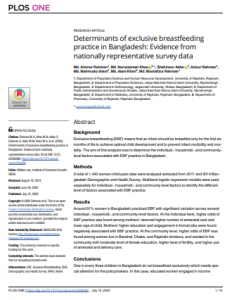
Background
Exclusive breastfeeding (EBF) means that an infant should be breastfed only for the first six months of life to achieve optimal child development and to prevent infant morbidity and mortality. The aim of this analysis was to determine the individual-, household-, and community-level factors associated with EBF practice in Bangladesh.
Methods
A total of 1,440 women-child pairs data were analysed extracted from 2011 and 2014 Bangladesh Demographic and Health Survey. Multilevel logistic regression models were used separately for individual-, household-, and community level factors to identify the different level of factors associated with EBF practice.
Results
Around 61% women in Bangladesh practiced EBF with significant variation across several individual-, household-, and community-level factors. At the individual level, higher odds of EBF practice was found among mothers’ received higher number of antenatal care and lower age of child. Mothers’ higher education and engagement in formal jobs were found negatively associated with EBF practice. At the community level, higher odds of EBF was found among women live in Barishal, Dhaka, and Rajshahi divisions, and resided in the community with moderate level of female education, higher level of fertility, and higher use of antenatal and delivery care.